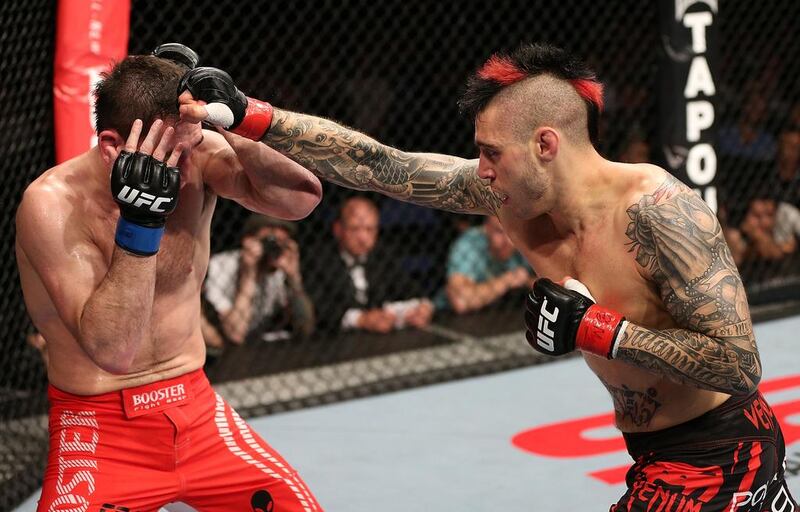At a guess, Dan “The Outlaw” Hardy would rather not talk about the heartlessness of the US health-care system. But he does it with a degree of articulation, it has to be said, that is not necessarily associated with the stereotype of a mixed martial arts (MMA) fighter.
In fact, with the hair, the tattoos and the nice line in blunt truisms, it is easy to imagine him in a long line of anti-establishmentarians.
It is the US health-care system that is preventing Hardy from fighting in the Ultimate Fighting Championship (UFC). He is in Abu Dhabi as the UFC holds a show in the capital for the first time in four years, but that is another story.
Last April, Hardy was to compete in his 11th UFC fight, against Matt Brown in San Jose. But after having an electrocardiogram ordered by the California State Athletic Commission so he could be licensed for the fight, a heart disorder was diagnosed.
Hardy has Wolff-Parkinson-White syndrome, where the presence of an extra, abnormal electrical pathway in the heart can lead to periods of accelerated heart beat. That diagnosis caused his fight to be cancelled. He has not fought since, a victim, he believes, of the US health-care system.
Hardy is British and doctors in the US told him he needed a minor surgical procedure to correct the condition. But Hardy has never experienced the symptoms (chest pain, breathing difficulties) and does not want the procedure.
He feels the system is designed to prescribe things people do not need.
“The health-care system is a business in the US,” he said. “I never had any preconceived notions but it always surprised me that you can’t walk into a hospital in one of the most powerful countries in the world and get treatment.
“It’s just the way the system is set up. Unfortunately, because it is a business, every doctor is a salesman. Is that not a conflict of interest? A guy trying to sell you surgery is trying to make money off it. Why would he give you an honest opinion?”
To further complicate the situation, but strengthen his resolve, his doctor in the UK has told him he does not need surgery.
“That is only a preliminary stage to getting cleared to fight. I have to go back and see that doctor in the US and see what his suggestion is now. At least I feel confident that my decision was the right one.”
The UFC have been understanding of the situation, they want him to be cleared to compete. In the meantime, they have inducted him into their broadcast team for their events in Europe, Africa and the Middle East.
Which is why he is in Abu Dhabi, sitting right by the octagon (the eight-sided ring in which the fights are conducted) and, as commentators are wont to say, telling it like it is.
“It just made sense. The UFC fans are familiar with me. I have a good following internationally. I’m a huge UFC fan and I get to sit by the octagon and watch the fight and be the middleman between what is happening there and the people at home,” he said.
“That’s a real privilege and honour to be able to do that.”
Hardy, 31, called his first show earlier this year and sounds genuinely proud of how it went.
“It was satisfying, though the feeling as an achievement to my first fight, is very different. There’s a huge adrenalin rush that comes with winning a fight,” he said.
“But at the same time, I felt very content with the performance and with everyone on the team. We put forward a great show. I always knew in training that if I was watching more fights I was evolving quicker.
“It’s so strange how easily you can learn by just watching. Because I’m right by the octagon I see it first hand and in action so my game is still evolving just by being a commentator.”
That is the continuing aim, that he eventually returns to the ring. If Hardy wanted he could probably fight for other promotions in other countries, or even states in the US. But the UFC, the “big show”, he keeps calling it, is what he wanted to get into ever since he began MMA properly in 2004.
It is probably what he has wanted to do since he began taekwondo at age six and began collecting different martial arts like others do stamps. Even now he continues to train and keep himself ready.
“I wouldn’t fight MMA for other organisations. As much as I love that we have others out there, I’ve become so accustomed to being a part of the UFC machine, it wouldn’t feel right. I wouldn’t have the same kind of passion to compete as I do here.”
osamiuddin@thenational.ae





